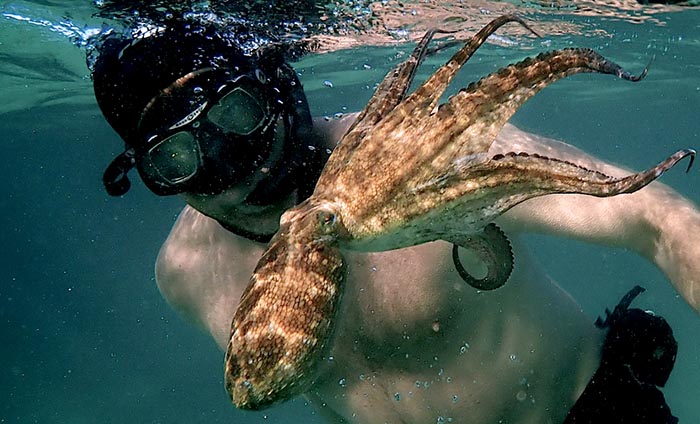News & Views
INTRODUCING… My Octopus Teacher
David Hyams reviews an award-winning documentary about friendship across species

This 2020 film, which won Best Documentary in the Academy Awards earlier this year, presents itself as an autobiographic sketch of a difficult period in the life of wildlife filmmaker Craig Foster. We are not told exactly what circumstances in his life were so challenging; instead we are shown his way out of them into a life of equilibrium and belonging.
It begins with his return to his childhood home on the very edge of the southern coastal tip of South Africa. Here the Atlantic Ocean is often wild and stormy, but below the surface are forests of giant kelp. Large leaves are attached by their long sides to their stems and gently open and close views as they sway in the ocean currents. He is taken with the beauty of the forest and slowly becomes aware of further dimensions of his surroundings – the coral reefs, rocks, shells, fish and molluscs. One day, he notices on the seabed a pile of shells and coral fragments, small stones and the odd sea anemone. Is it his imagination or is it slowly creeping along the sea floor? Suddenly it flies apart and out shoots an octopus. He follows and a chase begins which ends when she gains her den in a rocky cleft.
This is the beginning of what can only be described as a love affair in which he visits her every day and slowly gains her trust, laying back and watching as she goes about her life. He leaves his scuba gear behind and dives free, surfacing for breath in order to minimise his impact. For a year, he films her solving problems – evading predators, finding food – with extraordinary intelligence and ingenuity, and she reveals the mysteries of her world to him. One day a shoal of small fish come by, stacked vertically and geometrically like an Escher pattern. Suddenly she breaks the formation, swimming through, scattering fish. The shoal reforms, and again she bursts through – and again, and again. Watching this activity – in which not one fish is hurt – he realises that it is a game; she and the fish are playing together!
Some of the most moving sequences of the film document the growing friendship between these two different species. The moment when she extends a limb towards him and slowly explores his hand is pure magic. Before long, on another visit, she wraps herself around his chest. He raises the question of consciousness; she has no brain in the animal sense, but scientists believe that each of the pads on her limbs is individually aware of its surroundings. Foster comments:
“Many people think that an octopus is like an alien. But the strange thing is that as you get closer to them, you realise that they are similar to us in many ways.”
The final joy of this film is Foster’s growing realisation that the kelp forest is part of his world: “What she taught me is that we are part of this place, not a visitor. That’s a huge difference” Towards the beginning of the film he laments that he is in such a poor state that he cannot even bring up his son. It ends with father and son exploring under-water together and Foster introducing his teenage boy to the world of marine biology.
See the trailer here…
My Octopus Teacher is directed by Pippa Erlich and James Reed. It is available on Netflix.
More News & Views
Don’t Take It Easy
Richard Gault is inspired by Michael Easter’s book The Comfort Crisis and explores the idea of ‘misogi’ during a 600-mile walk across Scotland
Book Review: ‘The Serviceberry’
Martha Cass contemplates the message of a new book by Robin Wall Kimmerer that advocates ‘an economy of gifts and abundance’
Book Review: ‘Conversations with Dostoevsky’
Andrew Watson engages with an innovative new book by George Pattison which explores Dostoevsky’s relevance in the contemporary world
Thich Nhat Hanh & the Poetry of Engaged Buddhism
Philip Brown presents the poem ‘Recommendation’ and comments on the potential of contemplative art to foster compassion
Introducing… ‘Perfect Days’ and ‘Nowhere Special’
Jane Clark watches two films with a contemplative theme
Book Review: ‘Irreducible: Consciousness, Life, Computers and Human Nature’
Richard Gault reviews a new book by Federico Faggin, one of the leading lights of the science of consciousness
FOLLOW AND LIKE US
——————————————
——————————————
——————————————
If you enjoyed reading this article
Please leave a comment below.
Please also consider making a donation to support the work of Beshara Magazine. The magazine relies entirely on voluntary support. Donations received through this website go towards editorial expenses, eg. image rights, travel expenses, and website maintenance and development costs.
READERS’ COMMENTS
2 Comments
Submit a Comment
FOLLOW AND LIKE US
Excellent review David. You have caught swimmingly the relationship between man and mollusc. Made me want to watch it again and again – thank you
this article is very useful, thank you for making a good article